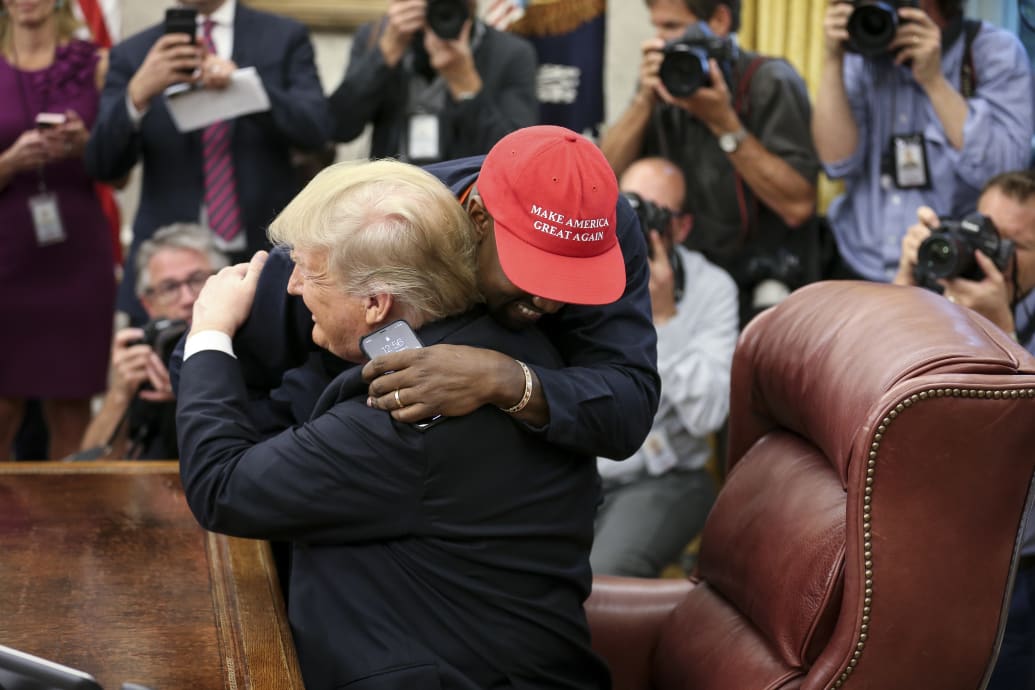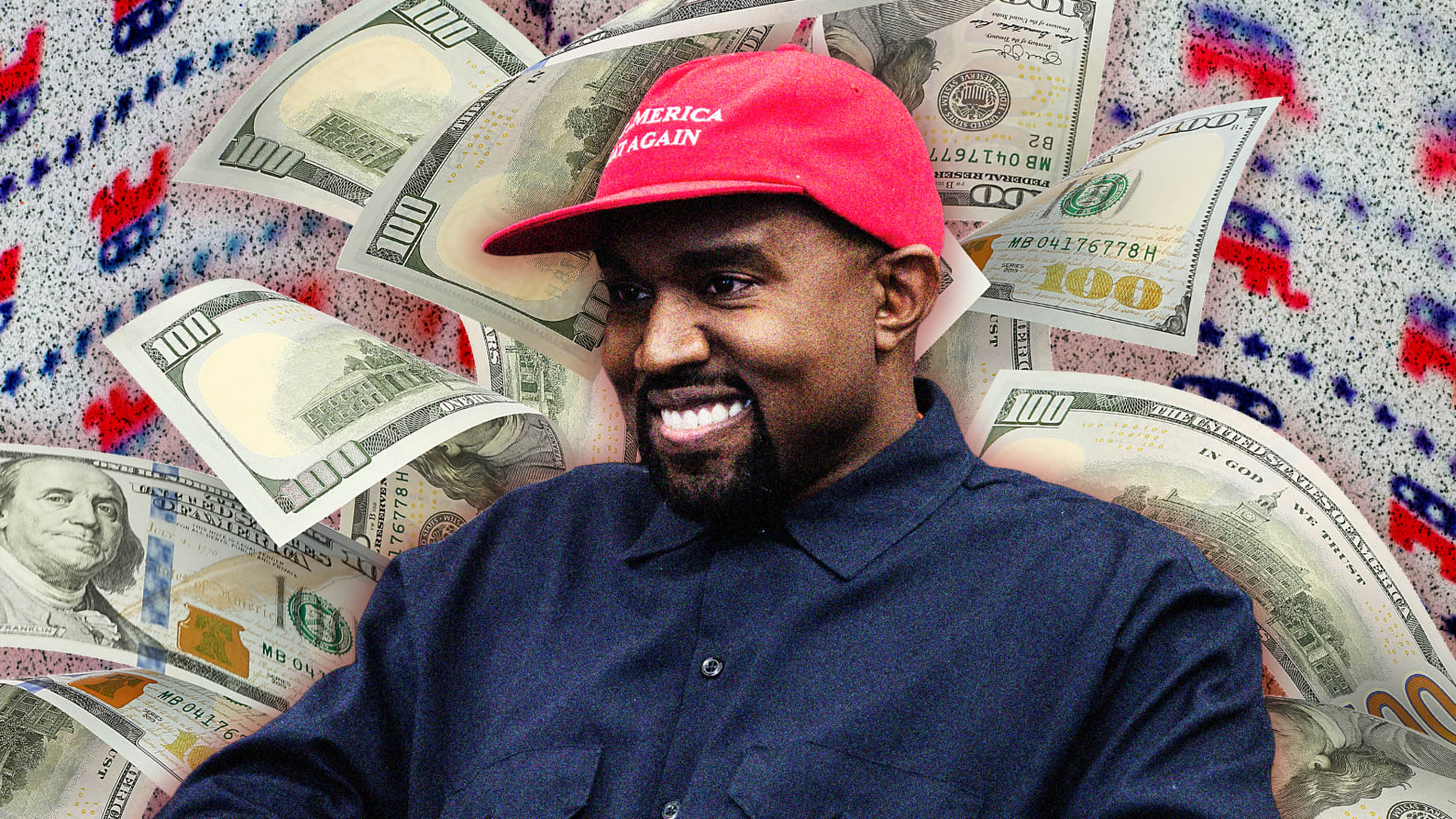Photo Illustration by Thomas Levinson/The Daily Beast/Getty
When Kanye West ran for President in 2020, it appeared that veteran political operatives of both stripes were more than happy to take the rapper and fashion mogul’s money. The truth may be far sketchier.
While it initially seemed like Republican and Democratic operatives were both benefiting from West’s quixotic White House bid, The Daily Beast recently revealed it was mostly GOP insiders who ran Kanye’s campaign, with many of them taking extraordinary measures to hide their involvement—so extraordinary, in some cases, that the campaign and the operatives may have run afoul of federal transparency laws.
But there was one major exception to the political allegiances of Kanye’s consultants, giving the campaign the appearance of bipartisan cooperation: Millennial Strategies.
The New York City-based firm has deep Democratic roots and is known for advising ultra-progressive candidates and causes, so it was notable that in a red sea of right-wing advisers Millennial Strategies was a dark blue buoy, bobbing above the waves and taking in about $2.7 million from the West campaign between July and August 2020.
That association between West and Millennial Strategies, however, appears designed in part to mask the extent of other companies’ work for the West campaign.
According to multiple people with knowledge of the arrangement, a substantial chunk of Millennial Strategies’ responsibilities was subcontracted to yet another consulting firm with right-wing ties: Mercury Public Affairs.
Mercury, which is nominally bipartisan but has far stronger Republican connections—as well as tiestodictatorships—has a troubled past. And they appear to have taken the Kanye 2020 campaign indirectly as a client, in a way that is not apparent in the campaign’s books. As other outlets have noted, Kanye 2020’s federal financial filings do not show a single dollar remitted to Mercury or any of its affiliates.
But sources indicated to The Daily Beast that much of the money that went to Millennial Strategies was in fact for work helmed by Mercury.
The sources, who spoke on the condition of anonymity because of what they described as nondisclosure agreements, said that Mercury Senior Vice President Ted Anastasiou had a personal contact with the West team and initiated the relationship between the company and the aspiring commander-in-chief.
However, according to these sources, higher-ups at the firm were hesitant about affiliating with the mercurial Grammy recipient and his presidential pipe dreams. They devised a solution: to have Anastasiou tap personal connections to Millennial co-founders Alex Voetsch and Jeff Guillot, whom Anastasiou knew through the local chapter of the liberal New Leaders Council and charitable causes, and arrange it so that the payments to Millennial would actually go to Mercury.
The wall between Millennial and Mercury was apparently so thin that multiple campaign sources told The Daily Beast they did not realize Millennial was an independent firm at all; they believed it was a shell company created by Mercury specifically for disguising the payments.
Public records support at least part of this version of events. Domain registration history for Kanye West’s campaign site, kanye2020.country, shows the original registrant was a company called Politxt—a subsidiary of Anastasiou’s personal firm, Politech LLC. Politxt, which provides texting services and does not appear to count web registration among its key services, remained the registrant organization from mid-July 2020 until early that September.
Another website, ye20.us—apparently never used—was registered in Anastasiou’s name and at his home address in New Jersey.
Yet the only company Yeezy ever paid for website services was Millennial—roughly $206,000, or about 8 percent of its $2.7 million haul between July and August. (Another company that did website work, SeedX, claims it received no money for its services and is currently pursuing a multimillion-dollar lawsuit against the campaign and consultants.)

Kanye West hugs then-President Donald Trump during a meeting in the Oval office of the White House on October 11, 2018.
Pool
Reached for comment, Anastasiou did not deny his or Mercury’s relationship with either West or with Millennial. He acknowledged that the payments to Mercury occurred, but pleaded ignorance about the details.
“I’m not too sure how the payments were structured,” he told The Daily Beast.
Anastasiou also insisted that he and Mercury did no further paid work for Kanye after registering the domain names.
But a year ago, another Mercury official, Michael McKeon, told The New York Times a different—and more expansive—story.
According to McKeon, the firm was assisting West “primarily by helping to recruit a ballot access team and launch that effort.” He also said that Mercury functioned as a go-between for the campaign and a vague group he referred to as “the team,” but declined to tell the Times why the campaign did not report any payments to Mercury.
The scope of that portfolio suggests the firm was central to Kanye 2020’s first months.
The Daily Beast also reviewed internal communications suggesting Mercury’s services went further, encompassing social media and other online tasks. The firm appears to have registered the Kanye 2020 Facebook page, which says it was created by Mercury Public Affairs LLC on July 15, 2020. All posts on the page are dated two days later, with the same message: “Put Kanye on the Ballot in South Carolina.”
That page was also boosted by campaign money—its own transparency portal shows that Kanye 2020 dropped $30,000 into targeted ads that ran in the Palmetto State between July 18 and July 20.
“Sign this petition to place Kanye West on the South Carolina ballot,” the ads read. The links they invited users to click on no longer function, and no archived images of the landing pages appear to exist, but New York magazine reported in 2020 that West was collecting digital signatures to run in November in South Carolina.
On July 16, Kanye 2020 had disbursed $103,658 to Millennial Strategies for “Ballot Access Digital Services.”
It’s not clear, however, how much work Millennial itself did, and how much of its services were simply as a conduit. And legal experts say that makes a difference.
Dan Weiner, former senior counsel at the Federal Election Commission who now serves as deputy director of the Brennan Center’s Election Reform Program, explained that firms who contract with a campaign must perform real work for the campaign.
“In general, the legal principle is that a vendor cannot simply be a conduit. They must in some way provide the services that the campaign is paying them for,” Weiner said.
And there is evidence to suggest that Millennial was, if not exclusively, extensively acting as a conduit. For instance, the campaign paid the firm $145,000 for legal work, even though Millennial Strategies does not advertise legal services on its website and has never been paid legal fees by any other federal political committee, according to federal data.
Another well-known consultant for the Kanye campaign, ballot access expert Steve Kramer, acknowledged he had also received payment through Millennial—though he maintained this was a normal subcontracting arrangement.
And while one source told The Daily Beast that Millennial was a hub between the campaign and its various Republican consultants, multiple sources contradicted that claim, claiming the main connection between Millennial and the Yeezy presidential machine was Anastasiou and Mercury.
Jordan Libowitz, communications director at watchdog Citizens for Responsibility and Ethics in Washington, explained that campaigns and vendors are increasingly working through subcontractor relationships. That can be tricky legal territory, and poses difficulties for regulators.
“There are many reasons Millennial could have taken the job and then subcontracted out a lot of the work,” Libowitz said, adding it would be an issue if Millennial was never doing much for West, and its purpose was to hide payments to Mercury. To that end, the conflicting explanations—most specifically Mercury’s own—cloud a true understanding.
Still, Libowitz noted that the details surrounding the Mercury arrangement were particularly “weird.”
“You sometimes see this going the other way, with candidates trying to disguise who they’re paying. But vendors don’t usually try to hide their connections,” he said. “Maybe they worried they wouldn’t be taken seriously if they worked for Kanye, but I don’t understand why they would actively try to hide this.”
The motivations for secrecy are murky, and it’s possible that multiple explanations are true at the same time. After all, the West campaign—run by an eccentric billionaire who appears to have been going through an apparent mental breakdown—may have been ripe for both financial and political exploitation.
One campaign source said that it “felt like both.”
“The thinking was that Kanye could go long-term,” the person told The Daily Beast, referencing the Republican forces behind West. “There was no way he was going to win, but they thought he could play some kind of political role—set up a PAC and drive donations to the PAC, endorse candidates, speak on issues and set himself up for a bigger role maybe in 2024.”
While the extent of Mercury’s ties to Kanye may have been effectively masked, Millennial Strategies may have actually had more to gain from anonymity than Mercury.
Shortly after taking up with the West campaign, the staunchly progressive firm quickly found itself in bed with Republican operatives—so many that Democrats began to accuse the GOP of trying to exploit West as a spoiler to siphon Democratic votes from then-candidate Joe Biden.
Last month, The Daily Beast reported that the top Republican operative behind the campaign—Jill Holtzman Vogel, the managing partner at a powerful conservative law firm bearing her name—also kept herself out of Kanye 2020’s public payments, despite claiming in private campaign conversations to have been the official attorney from at least July 2020 through January 2021.
Four people with direct knowledge have since told The Daily Beast that Vogel, a former chief counsel at the Republican National Committee, was the campaign’s mastermind from the beginning, handling federal compliance, ballot access, website and store setup, and general legal advice.
Vogel’s firm—Holtzman Vogel Baran Torchinksy & Josefiak PLLC—has a long history in election law. That work includes voter suppression efforts, such as two redistricting lawsuits last year. The firm also represents the Honest Elections Project, which in 2020 spent $250,000 on ads against mail voting, and filed adjoining briefs to election lawsuits in multiple states.
Rick Hasen, legal scholar and election law expert at the University of California Irvine, said Vogel’s involvement was in line with broader Republican efforts last year to throw wrenches into the democratic process. And all the efforts at secrecy, he said, were telling.
“It is not surprising to see that some of the same people who help spread the false myth of widespread voter fraud and make it harder for voters to register and to vote were also behind the faux Kanye candidacy that was intended to help Trump and siphon votes away from Joe Biden,” Hasen said. “Both Democrats and Republicans have played this game in the past, but the efforts here seem to be more serious (with Republican support hidden from public view in real time).”

